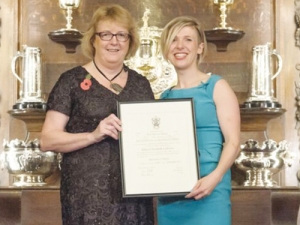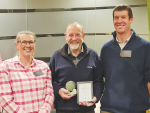Rebecca Gibb may not be very big in stature – but her place in the world of wine is immense, having just achieved her Master of Wine accreditation.
One of 340 MWs throughout the world, Gibb is New Zealand's 11th Master.
It has been six years of solid slog to get to this point, made even more special by the fact that during that time she moved hemispheres, got married, added a mortgage to her list of achievements and became a mother. Pretty impressive you have to say.
On top of that, at the MW induction in early November, she was awarded not only the Bollinger Medal in recognition of outstanding tasting ability, but also the Outstanding Achievement Award, for top student.
English by birth, Gibb undertook History and Politics at university. But once in the workforce, she had two very definite loves.
"I was in the wine trade at the time and I wanted to be either a journalist or a winemaker," she explains. "Then I got the opportunity to do a vintage in Australia in 2006. I quickly discovered that winemaking probably wasn't for me, being so clumsy and not at all practical."
So on her return to London, she undertook some night courses and having already written some journalistic pieces while at uni, decided to enter a young wine writer competition.
"This was in 2006 and I won it. I was offered a couple of weeks work experience, unpaid, in London with Harpers trade magazine. After a week they offered me a full time position. I was obviously very good," she jokes.
Some people thrive on learning – although Gibb says she wouldn't have thought she was one of them. Despite having undertaken her WSET Diploma, she wasn't looking at expanding her learning any further.
"I swore that I would never go on and do a Master of Wine, because the WSET Diploma was a massive undertaking. But then," another burst of laughter, "I put on my rose tinted glasses and thought maybe it might be a good idea for me to have a go. As a challenge."
That was 2009.
"I wasn't married at the time, I didn't have a mortgage, didn't live in New Zealand and didn't have a child."
All that was to happen over the next few years.
By 2012, she had passed all her exams. Then came the part she thought would be the easiest component of the MW criteria, coming up with a subject for the Research Paper.
"I thought the tastings were going to be the hardest part. You have to know wines from every country, every region right down to the little village in France that a particular wine comes from. That's not easy, you have to have that real detail. I thought that I would breeze through the Research Paper and become an MW by 2013. I soon learned that wasn't the case."
Before you can even begin researching an idea, you have to come up with an approved synopsis. That's where things became sticky. Two synopses were turned down, and in each case she had to wait another year before she could present another one. Then finally in 2014, it was third time lucky. Her synopsis of investigating the 1911 Champagne Riots was accepted. The idea came from, what she calls, a little bedtime reading.
"I was reading Wine and War and found it really interesting, so I decided I wanted to find out more about it."
Unfortunately there wasn't very much about the riots and what the catalyst was in anything other than French texts. Luckily for Gibbs, she reads French well.
"I found out that nobody had looked at whether the people in Champagne were hungry or not. Others had looked at whether (the riots of 1911) were caused by socialists or because of the fraudulent production of Champagne back then, but it was obviously a multi faceted problem. In 1910 the wheat, oat and potato crops all failed. Basically there was nothing to eat and what there was, was very expensive. The grape crop had failed that year as well, there were basically no yields, so these people had no money, no food and that led directly to the riots. It was an economic situation, not a socialist one."
Alongside wine, history is an endearing subject for Gibb and having written this thesis, she is keen to do more.
"That's the plan. My ultimate ambition is to write wine history books in a Bill Bryson sort of style, so people want to read them. I want them to be a rip roaring read, well researched and for them to make me as much money as J.K Rowling."
In the meantime she is basking in having finally achieved her goal, a few years later than she would have liked, but achieved none-the-less.
And while she is New Zealand's 11th MW, she is likely to be joined by three others in the near future, given Michael Henley, Amy Hopkinson-Styles and Stephen Wong are currently working on their MW research papers.












